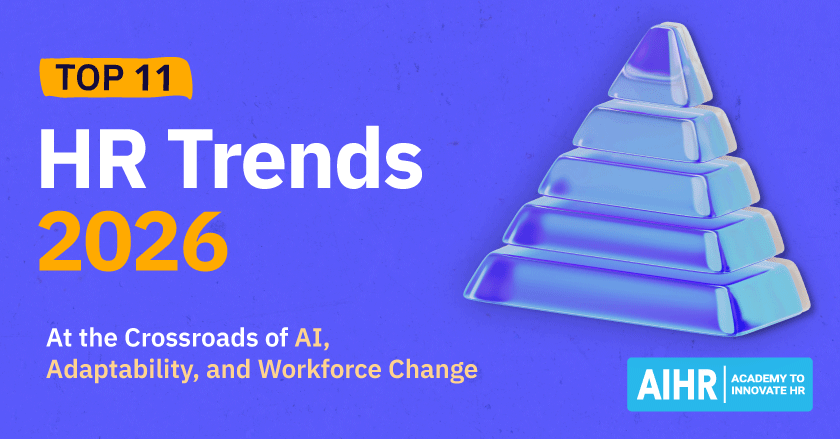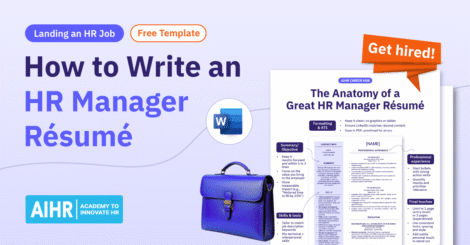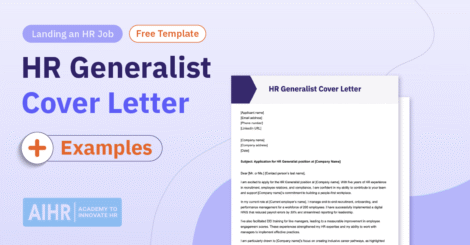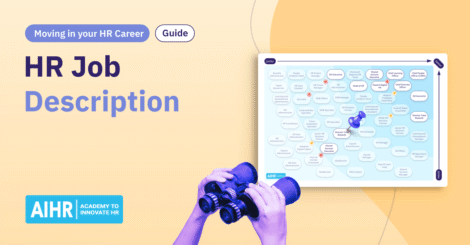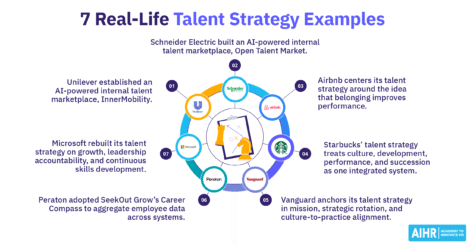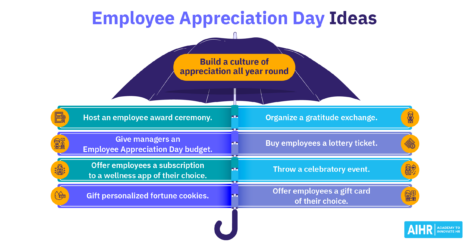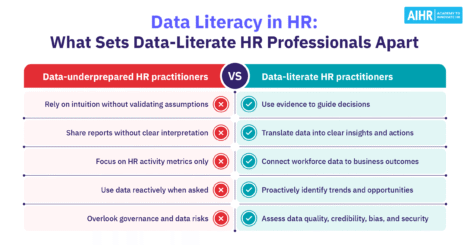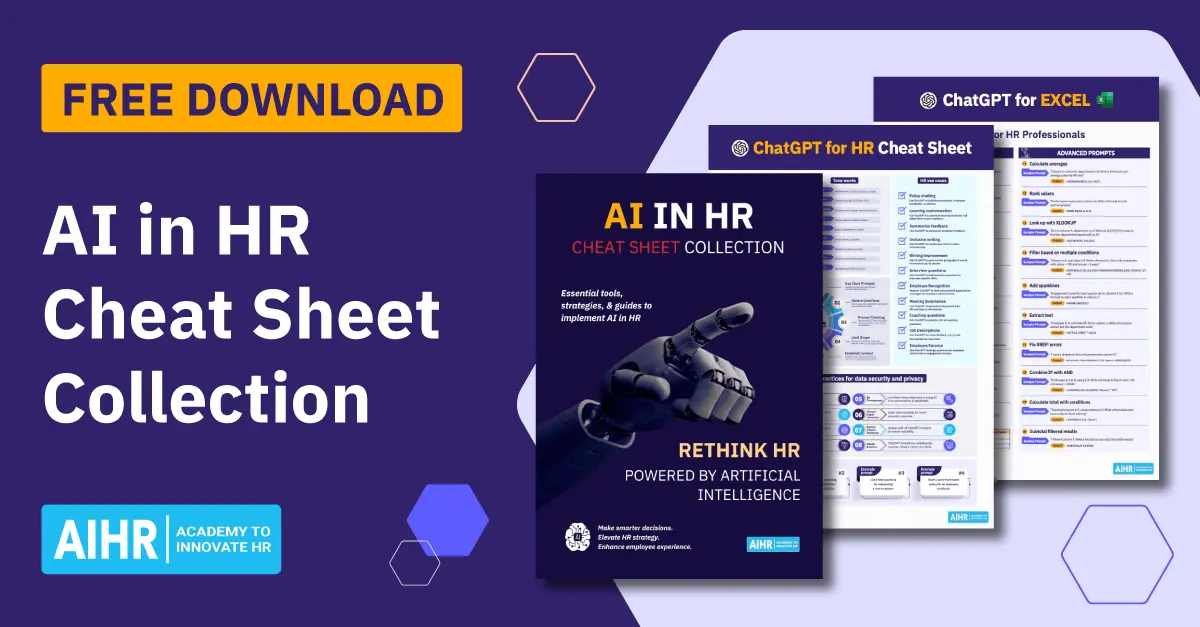The Employee Relations Executive directs an organization’s employee relations programs, policies, and procedures. They manage the activities of and services provided by the Employee Relations team or department.
Contents
Role family & work experience
Key responsibilities
Job description template
Detailed responsibilities & tasks
KPIs for this role
Role family & work experience
- HR Role family: Strategist
- Work experience: 6-12 years
Key responsibilities
- Contribute to setting the global IR/ER strategy and lead its implementation.
- Support the country HRBPs managing relationships with unions & ensuring consistency with its core business values and alignment with the global approach.
- Develop and maintain policies, procedures, and guidelines for employee relations, including collective bargaining agreements, discipline, performance management, and dispute resolution.
Job description template: Industrial Relations Executive
The Industrial Relations Executive is responsible for managing employee relations, promoting positive work environments, ensuring compliance with labor laws, and mitigating risks associated with industrial disputes.
Responsibilities:
- Develop and implement employee relations strategies and programs that support the company’s objectives and foster positive working relationships with employees, labor unions, and other stakeholders.
- Serve as a liaison between management and employees to identify, address and resolve employee concerns, disputes, and grievances.
- Develop and maintain policies, procedures, and guidelines for employee relations, including collective bargaining agreements, discipline, performance management, and dispute resolution.
- Develop and maintain strong relationships with external stakeholders such as labor unions, government authorities, and legal counsel.
- Advise and support managers and supervisors on matters related to employee relations, labor laws, and HR policies.
- Participate in collective bargaining negotiations and other labor relations activities to ensure a favorable outcome for the organization.
- Monitor and analyze employee relations data and trends to identify potential issues and develop strategies to address them.
- Develop and deliver training programs for managers and supervisors on effective employee relations practices and procedures.
- Ensure compliance with applicable labor laws, regulations, and industry standards.
- Manage and provide oversight to the industrial relations team.
Requirements:
- Bachelor’s degree in Human Resources, Business Administration, or a related field.
- 8-10 years of experience in industrial relations, with experience in a leadership role.
- n-depth knowledge of labor laws and regulations in the regions of operation.
- Experience in negotiating collective bargaining agreements and other labor relations activities.
- Excellent interpersonal, communication, and conflict resolution skills.
- Strong analytical, problem-solving, and decision-making skills.
- Ability to build relationships with a diverse range of stakeholders and work collaboratively to achieve common goals.
- Strong leadership skills and experience in managing and developing teams.
- Strong attention to detail and ability to manage multiple priorities simultaneously.
- Ability to work independently and take initiative.
Detailed responsibilities & tasks
- Develop and implement employee relations strategies and programs that support the company’s objectives and foster positive working relationships with employees, labor unions, and other stakeholders.
- Serve as a liaison between management and employees to identify, address and resolve employee concerns, disputes, and grievances.
- Develop and maintain policies, procedures, and guidelines for employee relations, including collective bargaining agreements, discipline, performance management, and dispute resolution.
- Develop and maintain strong relationships with external stakeholders such as labor unions, government authorities, and legal counsel.
- Advise and support managers and supervisors on matters related to employee relations, labor laws, and HR policies.
- Participate in collective bargaining negotiations and other labor relations activities to ensure a favorable outcome for the organization.
- Monitor and analyze employee relations data and trends to identify potential issues and develop strategies to address them.
- Develop and deliver training programs for managers and supervisors on effective employee relations practices and procedures.
- Ensure compliance with applicable labor laws, regulations, and industry standards.
- Manage and provide oversight to the industrial relations team.
Detailed skills description
- Knowledge of labor laws: Understanding of the latest labor laws and regulations is critical in ensuring compliance with legal requirements, handling disputes, and ensuring a harmonious working relationship between management and employees.
- Negotiation skills: A key part of the job of an Industrial Relations Executive is to mediate between management and employees during disputes or negotiations. Strong negotiation skills are essential to ensure the best outcome for both parties.
- Communication skills: Excellent communication skills are necessary to interact with employees, management, and legal representatives. The ability to communicate effectively, both orally and in writing, is essential in establishing trust and maintaining transparency with all parties.
- Analytical skills: The ability to analyze data, identify patterns, and make recommendations is essential for an Industrial Relations Executive. They must have the skills to evaluate data and identify the underlying causes of disputes and conflicts.
- Problem-solving skills: An Industrial Relations Executive should be capable of identifying issues proactively, proposing solutions, and managing conflicts that may arise in a fast-paced environment.
- Conflict resolution skills: An Industrial Relations Executive must have the ability to understand the root cause of conflicts, remain objective, and effectively manage conflicts to maintain a harmonious working relationship between management and employees.
KPIs for this role
- Collective bargaining: negotiating and implementing collective bargaining agreements that are fair and beneficial to both the organization and its employees.
- Employee relations: maintaining positive relationships with employees, including handling grievances, disputes, and disciplinary issues in a fair and consistent manner.
- Compliance: ensuring compliance with all relevant labor laws, regulations, and policies, and avoiding any legal or regulatory violations.
- Labor costs: managing labor costs and identifying opportunities to improve productivity and reduce costs.
- Communication: effectively communicating with employees, management, and external stakeholders on industrial relations matters.
- Training and development: providing training and development opportunities to employees and managers to enhance their understanding of industrial relations issues and their ability to manage them effectively.
- Safety and health: ensuring compliance with safety and health regulations and policies to provide a safe and healthy workplace for employees.
- Employee engagement: promoting employee engagement and morale through effective communication, recognition, and involvement in decision-making processes.
- Performance management: managing employee performance to ensure that organizational goals are met and employees are held accountable for their performance.
- Metrics and reporting: tracking and reporting on key industrial relations metrics to monitor performance, identify trends, and recommend improvements.


